Welcome to the week.
Here are the most noteworthy items we came across in the past seven days.
Black voices and Bicycling: Must-read content from major cycling media outlet Bicycle Magazine, who devoted their cover(s) and issue this month to first-person accounts of bicycling while Black from leaders and leading voices.
Climate failures: Economist Joe Cortright eviscerates Metro’s 2020 transportation funding package for its feckless approach to major greenhouse gas emission reductions.
Planning revolution: Decrying how “local control” in faux-gressive cities is a barrier to zoning code changes that would lead to more affordable housing, the founding president of the American Planning Association writes in Streetsblog that, “The planning profession must now play a leading role in the reformation of land-use decisions.”
Rad story: The rise of Rad Power Bikes (which are very popular here in Portland) is amazing story of entrepreneurialism and the maturation of a once-niche product.
“Truck bloat”: The design and popularity of large trucks is linked with the startling rise in vulnerable road user deaths in America and more people are realizing that the U.S. auto industry is largely to blame.
Environmental injustice: As per the item above, Willamette Week reporters found that high Covid-19 infection rates east of 82nd can be linked to places with overcrowded housing conditions and Grist did a video to explain why Portland neighborhoods that were historically redlined are hotter in summer.
Advertisement
Biden on a bike: Presidential hopeful Joe Biden made headlines for simply going on a nice bike ride over the weekend.
Cars and Covid: This article bears out what I’ve heard anecdotally, that for too many people, cars seem to be winning the urban transportation mode choice competition.
Ban road expansions: A report for the auto industry by a leading consultancy firm makes it clear that pandemic-related behavior changes mean we’ll have less driving and fewer cars on the road for the foreseeable future, so why would we continue to fund highway expansion mega-projects?
Bike shortage: Interesting look at how Trek Bicycle prepared for — and is still dealing with — the global bike supply crunch that is crippling the U.S. bike industry.
E-bike, please! A sure sign of a smart and sensible government is to aggressively subsidize the purchase of electric bicycles.
No more cops: The California Bicycle Coalition is the latest organization to map out a strategy for reducing the role of police in traffic enforcement.
Video of the Week: We need more bikes like this. We need more bike ads like this. Thank you Tern Bicycles!
— Jonathan Maus: (503) 706-8804, @jonathan_maus on Twitter and jonathan@bikeportland.org
— Get our headlines delivered to your inbox.
— Support this independent community media outlet with a one-time contribution or monthly subscription.



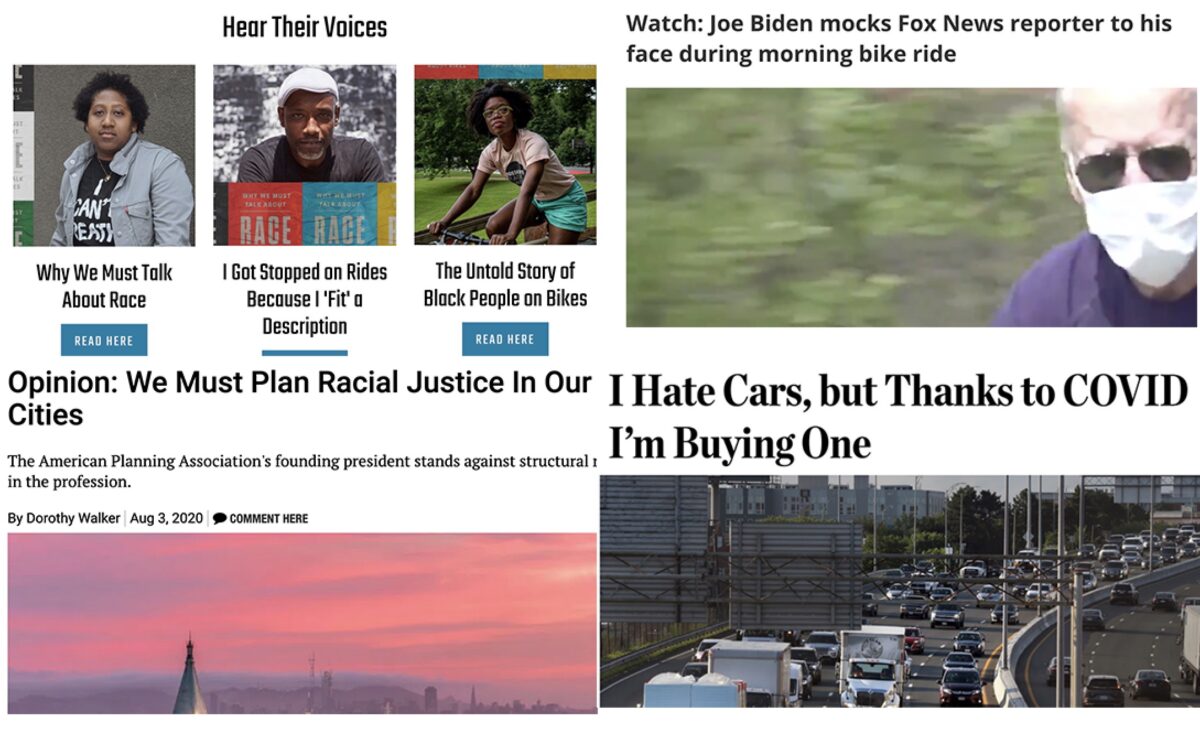
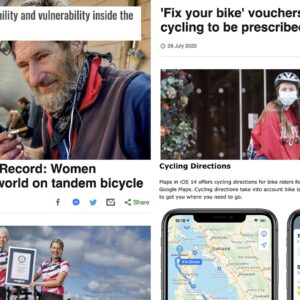
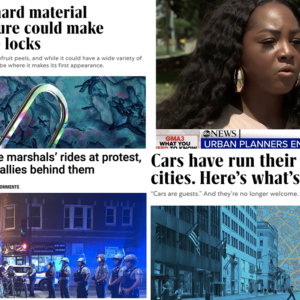
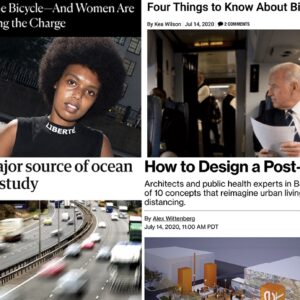
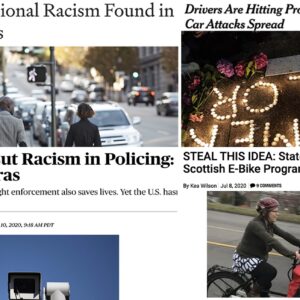
Thanks for reading.
BikePortland has served this community with independent community journalism since 2005. We rely on subscriptions from readers like you to survive. Your financial support is vital in keeping this valuable resource alive and well.
Please subscribe today to strengthen and expand our work.
The article on banning road expansions because of a decrease in car traffic in the present and future is spot on. Is there any version of the future during the next two or three years where more people are driving their cars to jobs in office towers or shopping malls vs work from home, order from home? Even if more demand comes back after that, the ongoing collapse in the conventional and shale oil industry around the globe will leave us with such a stunted fossil fuel industry that motoring for the masses will effectively be over. Lets not double down on the dinosaurs after the meteor hits.
We have heard similar versions of your story for decades and it has never come to fruition.
So, context. Did more than zero of those decades have a persistent pandemic?
Yes unfortunately: polio (up through the 50s), common Asian flu, Swine Flu, SARS (thankfully eradicated), MARS (now endemic alas), and coronavirus 1 through 4 (aka the common cold.) And of course there’s HIV/AIDS, HPV, various cancers, lung disease, etc. Lots of deadly pandemics to choose from. And yet we are somehow still here, still driving gas-guzzling infernal combustion engines.
2 years ago I was reading a story about how unprepared the world was for a global Pandemic. The story went on to list the drastic economic consequences of a pandemic of even modest mortality on the world economy. Many commenters chimed in that it had been 100 years since such a thing happened so the author was clearly wrong.
Just because several cycles of a prophecy fail to come through doesn’t mean it won’t eventually.
Also, thanks to videoconferencing technology we probably have a permanent shift of a significant reduction in physical commuting. Even after the pandemic and people are going back to offices, it is not likely that most people will go to their office every day. Overall we are likely to see a significant net reduction in driving.
Will the emptier roads induce additional demand, prompting people to live further away from services and their jobs? Possibly. Enough to offset the direct reductions? Probably not, since compensatory effects tend to be less than 100%.
It’s not so much that traffic has gone up or down, but that there is no longer such a huge AM and PM peak “rush hour”, that the heavy traffic is now much more spread throughout the workday and even into the evening. Our roadway system is designed to handle the pre-covid peaks and now those peaks are much smaller than they used to be, even as our overall traffic volume has returned to normal. In Portland for example, before covid there was much less traffic typically from 10 am to noon as most people were at work by then; now with many people working at home and going to the office only once in a while, the the 10 am to noon traffic has increased, but the 6:30 to 8:30 am peak traffic has gone down.
There has also been a significant reduction of interstate travel as so many businesses (and even whole states) are more or less shut down, but this will prove temporary. This has a bigger impact on the East Coast as there are more states closer together, but it impacts nearly every state, even those dozen that never really shut down at all. And everything will “return to normal” once the various ineffective vaccines are given out and we “get used” to having a high annual death rate from covid as we already do for the flu.
We’ve had the videoconferencing technology for decades, but it has only become “mainstream” during the crises, especially for us Luddites, technophobes and old farts. But as the Portland city planners pointed out when they were developing the Portland Plan, people don’t change where they live very significantly even after 2 decades barring a cataclysm (which this pandemic most certainly is not). 20 years from now Portland will continue to build upwards with higher densities, Vancouver WA will continue to sprawl as a consequence, and Americans will feel its their god-given right to drive their antique Prius cars wherever they please.
You sound like the person in the WH as usual, this Covid is nothing, it will go away,…didn’t happen really….A Covid denier.. laughable.
The US went from being a significant importer of fossil fuels to basically self-sufficient, perhaps even a bit of an exporter. The difference? The fracking boom. With that boom came severe environmental impacts (ruined drinking water wells, big tanks and ponds full of waste, earthquakes!) and a financial bubble that won’t be real to us until it pops. It’s a coyote-running-on-air kind of situation.
Fracking had a much bigger impact in the natural gas industry than in oil; it was horizontal drilling technology the lead to the recent boom in North Dakota oil. I agree with everything else you wrote.
I’ve really been on the fence for the Metro ballot measure. I was not really fond of it, but thought it was probably better than doing nothing. But that excellent analysis by Joe Cortright makes me a pretty firm No vote.
Lowell, I have been on the fence, too. Do you (or anyone else) have any sense if the longterm benefits of adding a new train line could outweigh the near term shortcomings of this bill? Or be more direct, if anyone out there is planning to vote yes, what is your thinking?
Are there benefits to adding a new train line? It seems like the cost of the choo choo and the opportunity cost of building BRT or expanding bus service will make the new train a net loss
It seems quite possible that BRT and even regular bus service on routes that heretofore have seemed impractical would be a net loss as well. At some point, we’re going to need to go beyond what worked in the early 20th century and develop some new thinking in the transit/transportation space.
Maybe something light and strong and adaptable, something cheap enough that many people can finance it with their discretionary income, or by selling some old, rapidly depreciating thing that is hard to store and expensive to maintain? 😉
A lot of Metro’s big new ideas involve laying down a bunch of concrete. Concrete includes cement (stone that is mined, crushed and baked at a high temperature) gravel (same but without the baking) and sand (dug from river beds and valleys) and water, which for the moment we seem to have plenty of. All this digging, crushing and baking, plus the mixing and hauling, represents a big front-loaded CO² release to move the graph by just the thickness of the line.
I like to ride on new pavememt just as much as anybody, but we need to use some discretion in where we invest our money and our resources. Our planet can take a certain number of hit points. It’s a really big number but it’s finite and we don’t know what it is.
It sounds crazy, but there’s a world sand shortage. It’s being pirated from public lands and nature reserves. Construction sand is actually kind of a special thing. You can’t really make it, you have to go out and dig up part of the natural world to get it.
To this day I don’t understand Portland’s infatuation with LRT. Give me BRT or more frequent standard buses over our mismanaged and bungled LRT any day. Think of the world-class bus system we could have if it weren’t for spending so much money on LRT.
The point of LRT isn’t to move people, which it does poorly, but to excite developers into redeveloping poorer “blighted” areas to encourage young rich white people to move in. In Portland, Minneapolis and Sacramento it has worked beautifully. Your city council has historically been highly linked with the real estate industry, as developers, lawyers, realtors, and lobbyists – it doesn’t matter if you live in Portland, Seattle, Greensboro, DC, or Podunk Junction – it’s true for any US city (and much of the rest of the world too.) Remember the Golden Rule – Those with the Gold, Rule.
I agree, but more importantly, how did you manage to have a blank space for your name? If I refer to a comment of yours, what do I call you?
I use the HTML code for a non-break space. Refer to me as whatever you want 🙂
‘Sup, Spacey?
PS Thought Jonathan didn’t publish my other reply to this, there are many unicode whitespace characters that this software seems to accept, allowing plenty of room for us all to adopt whitespace handles. In fact, I may start posting my comments entirely in whitespace. . , ? – .
, .
LRT has lower operating costs than busses, so it works well for high-ridership corridors. The blue line definitely meets this requirement, but the other lines are debatable. If the line can’t support 15-minute or better service with 2-car trains, it should probably be a bus line.
The problem with BRT projects, though, is that they are really easy to water down. Have you been on Seattle’s “Rapid Ride” lines? They aren’t very rapid.
ODOT won’t let them take a lane on 99W for actual BRT. So you either spend nearly as much giving busses their own ROW, or you have “BRT” that gets stuck in traffic just like the 12. There’s no free lunch here.
The Strong Towns article is by Joe Cortright. Good on him for two features.
What I got from his article is:
– Don’t build anything, it will just release more carbon.
– Metro staff are incompetent.
– Government taxes are bad.
He wasn’t offering any alternatives, just negatives, a bit like that tweeter nobody likes but that 60 million deplorables will still vote for.
When I see or hear anything Joe Cortright that’s pretty much what I see as well. I was more pointing out that one of the article was under the veil of “strong towns,” whatever that means. Maybe Joe can move into the new cave that I located over the weekend so he can get his wish of being carbon free.
I’m a little perplexed that JM even offered this article. Maybe he’s trying (too hard?) to offer a “fair & balanced” perspective?
I’d support banning ownership of trucks above a certain size without a permit. Unless you’re someone who needs to carry around large amounts of equipment on an everyday basis (e.g. you work for a landscaping company), there’s zero need to own one. If someone needs to move a large load, they can rent one for a day or hire someone to carry the load for them.
I think we just need to restrict the terms of a basic driver’s license and transfer those behemoths into Commercial Driver’s License territory, with stringent testing. First, prove that you can safely drive something that big.
I’ve been talking about this for 20 years, since larger SUVs started seriously catching on. At the time I thought the cutoff should be 4000 pounds curb weight, but now that the median passenger vehicle is heavier than that it’s probably not doable politically.
But a more doable threshold might be to require CDL for any vehicles (i.e., heavy duty and super duty pickups) that are big enough to be exempted from normal fuel economy, emissions and safety regulations. So you could drive a 5000 pound F-150 or Tahoe without a special license, but not an 8000 pound F-250.
1. Define “excessively large” as the 25% of vehicles that by design are the greatest hazard to other road users. Then 2. Make the theft and vandalism of these monsters fully, unequivocally legal. Choose to use a vehicle that endangers all other road users and the state should not protect it.
So today a person riding an E-Bike on 82nd Ave was hit and killed by someone riding a motorcycle. The motorcycle in question looks like a small cruiser like a Suzuki TU250 that only weighs 360 lbs. So most anything driving on the road can be deadly to bicycles and pedestrians. Spending time on the vehicle people drive is wasted. If you want to reduce VRU deaths focus on the person behind the wheel or in this case handlebars.
Both things are a factor. Bigger vehicles are more likely to injure and kill. Why can’t we address both the vehicle design and the drivers?
Focusing on outliers like this is misleading. Yes, even motorcycles can be dangerous, but bike haters are quick to point out that pedestrians have died after collisions with bicyclists.
Focusing on the fact that any vehicle can kill distracts from the fact that there are huge differences in deadliness based on vehicle mass, design and speed.
I don’t entirely disagree, but who gets to decide what kind of vehicle someone else “needs”? I think hardly anyone “needs” a Subaru or a Jeep, or any kind of SUV, yet plenty of people would disagree. Heck, many folks here don’t “need” any car at all.
Why not let me decide what you need?
That’s a good point, but we have to do something about the climate crisis and road deaths, and I think that includes banning the private sale of vehicles that get terrible MPG or are more dangerous when used irresponsibly. Whether we should use a weight threshold, size threshold, MPG threshold, or something else, I can’t claim to know the answer to.
Rather than “banning” and raising the ire of those who (perhaps reasonably) don’t want urban liberals telling them how to live their lives, why not make gas more expensive and let the problem sort itself out? There is a huge overlap between dangerous vehicles and inefficient ones, and also between MPG and climate-changing emissions.
We could create a carbon tax, and redistribute the proceeds as a kind of basic income, and enjoy world peace.
There, I just solved like 8 problems at once. What’s next on the docket?
People would simply use their basic income to buy and upgrade their SUVs, like they did with their $1,200 stimulus checks, rather than buy food or pay rent. You know they would.
That’s fine — it’s not my job (or yours) to tell people how to live their lives.
Many of us have argued for exactly that, for decades. I’ve advocated massive fuel taxes as a mechanism for reducing consumption, without necessarily giving specific dictates to what or how much people drive, since the 1980s.
Prior to the 1980’s many countries in Europe taxed cars based on engine displacement. I think that we can agree that the cars that evolved from this system and the countries that did it were pretty nice places at the time. I know if I had to choose between living in Florence in 1975 and driving an Alfa Romeo vs living in Gresham and driving a jacked up Chevy pickup with a 454 V8, it would be Italy all the way. Some kinds of stupid choices do not make us better or happier, they just make us dumber, and short lived.
I remember that time. Europeans had the most fuel-efficient cars, but at a cost of high noise and awful air pollution from their 4-banger cars – I still remember the pink skies of Milan in the 80s and exiting the Gare Du Nord in Paris into a sunny smoke-filled city as recently as 1999. When I visited 10 years later, the air was much cleaner and the cities much less noisy.
I also remember the bright yellow city water coming out of the spigot in Florence in 1985, but that has nothing to do with cars.
Air pollution in Europe was not because they had fuel-efficient cars; it was because of lax vehicle emissions standards. You can have cars that are both fuel-efficient and clean, but they did not require that until recently.
Right now we’re making the decision based on created desires and disposable income. We use vehicles for signaling more than we use them for moving stuff. Yeah, stuff gets moved but that’s a byproduct.
Pbot has essentially said what you can and cannot own by making street narrow and by adding oddly placed plastic wands on streets like SE 45th by Johnson Creek. The design was terrible and now the closest ones have been removed by neighbors.
So owning a boat, an RV, Dirt Bikes, ATVs, UTVs and etc. should just be outlawed. People do not buy vehicles based on a need. They but them because they want them. Just like bike riders buy $9000.00 carbon fiber bikes. Because unless your racing it do you really need one?
I never said that. Don’t put words in my mouth. I will not address this strawman argument.
You just got hit with the most common fallacy, strawman.
To be fair, I think buying a $9000 bike for weekend usage is perpetuating the toxic culture in cycling.
The bike commercial was hilarious! Empty streets free of other people, no homeless campers nor pedestrians nor public transit, no other traffic, happy rich suburbanites, a clean playground with no other kids (nor city signs banning their use because of Covid-19), no masks, like a BMW commercial for bikes. (No intersections either, did you notice? I bet you didn’t.) Very anti-poor, very anti-pedestrian and anti-transit, no mixed-race families or community (every group was either all-white, all-Asian, or all-black). And the brightly-colored bikes were so clean! (In spite of riding in polluted cities on dirty black asphalt full of tire and car exhaust grit.)
With a world so empty, why do they need locks? Are the squirrels going to steal them?
Maybe Taiwan is really like that! They pretty much defeated Covid in the first couple of months, and now Wall Street is freaking out because they are kicking Intel’s butt in making advanced computer chips. Perhaps that is how people from Albania viewed commercials from the US in 1979. There is something to be said about a country run by engineers and technocrats and not lawyers and c students from Yale and Penn.
The bike commercial was filmed in Taiwan. Taipei itself is virtually homeless free (due to a great safety net, and excellent mental healthcare). They also enjoy little petty crime and theft, and a Covid-Free environment. (this is a testament to the Taiwanese people more than anything)
The video was also 100% POC, along with a mixed couple. (WTF are you talking about?)
But yes, the streets were cleared to film the scenes… to show off and highlight the product they were introducing to the world. You might want to study up on this small and innovative company who are 75% POC themselves. You are railing against the wrong people.
Are you saying that Chinese are POC in Taiwan? That sounds pretty ethnocentric to me.
Nope, I’m saying the video has people of various nationalities and ethnicities… what are you trying to say?
Sorry if I misunderstood. I was responding to “You might want to study up on this small and innovative company who are 75% POC themselves.” I would expect a Taiwanese company to be majority Chinese. Referring to them POCs in that context would be using an American-centric viewpoint to analyze another culture. Perhaps that’s not what you meant?
Re: the Trek article, and everything I’ve heard about bikes being in short supply. Why am I unable to sell my Bridgestone 400?
Because you live in Portland, international headquarters of Chop Shop Industries, the nation’s leading supplier of used parts and custom-assembled bikes.
“Welcome to America’s Bicycle Chop Shop Capital”. Sorry for the pessimism I’ve had three bikes stolen here in 5 years. I must be really trusting or really dumb.
The people who waited for a pandemic to buy a bicycle are likely wary of buying a used bike. And TBH they are probably right to be. I love those old bikes, but they tend to need a little knowhow and TLC.